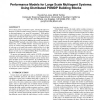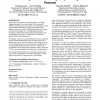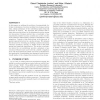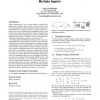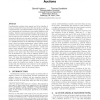ATAL
2003
Springer
14 years 4 months ago
2003
Springer
This paper presents an argumentation based framework to support the decision making of an agent within a modular architecture for agents. The proposed argumentation framework is d...
ATAL
2003
Springer
14 years 4 months ago
2003
Springer
Traditional centralised approaches to security are difficult to apply to large, distributed marketplaces in which software agents operate. Developing a notion of trust that is ba...
ATAL
2003
Springer
14 years 4 months ago
2003
Springer
Given a large group of cooperative agents, selecting the right coordination or conflict resolution strategy can have a significant impact on their performance (e.g., speed of co...
ATAL
2003
Springer
14 years 4 months ago
2003
Springer
Future large-scale software development projects will require engineering support for a diverse range of software quality attributes, such as privacy and openness. It is not feasi...
ATAL
2003
Springer
14 years 4 months ago
2003
Springer
In this paper, we examine two multi-agent based representations of SATs and further experimentally study the topologies of resulting agent networks. We show that different repres...
ATAL
2003
Springer
14 years 4 months ago
2003
Springer
In this paper we address the problem of automatically deriving vocabularies of motion modules from human motion data, taking advantage of the underlying spatio-temporal structure ...
ATAL
2003
Springer
14 years 4 months ago
2003
Springer
Peer-to-peer (P2P) technology has undergone rapid growth, producing new protocols and applications, many of which enjoy considerable commercial success and academic interest. Yet, ...
ATAL
2003
Springer
14 years 4 months ago
2003
Springer
Agents collaborating on a set of tasks subject to temporal constraints must coordinate their activities to ensure that all of the temporal constraints are ultimately satisfied. S...
ATAL
2003
Springer
14 years 4 months ago
2003
Springer
This paper describes how multiagent systems can be used to achieve robust software, one of the major goals of software engineering. The paper first positions itself within the sof...
ATAL
2003
Springer
14 years 4 months ago
2003
Springer
Combinatorial auctions where agents can bid on bundles of items are desirable because they allow the agents to express complementarity and substitutability between the items. Howe...

